Eerdmans Lutheran Thought and History Collection (15 vols.)
Digital Logos Edition
This product is no longer available for purchase.

Overview
This collection gathers contributions from top Lutheran scholars on Lutheran history and theology—a must-have for anyone interested in gaining deeper insight into Martin Luther’s thought and the church’s rich heritage. Highlights include the work and thought of distinguished Lutheran theologians Carl Braaten and Gerhard O. Forde, containing not only several of their important works, but also festschrifts, and Braaten’s memoirs, Because of Christ.
In this collection, you’ll get a wealth of recent Lutheran scholarship that deepens our insight into the nuances of Luther’s thought and expands our understanding of Lutheran history and contemporary church life. Scholars including Timothy Wengert, Robert Kolb, and Eric Gritsch unpack the Luther’s doctrine of law, examine the modern Lutheran church and its place in American life, confront Luther’s writings on Jews, and look at changes in the liturgy of the Church of Sweden, asking important questions about church liturgy, history, and change relevant not only to Lutherans, but to all Christian churches. Several works included are made available in English for the first time, and including the thought of Finnish theologian Tuomo Mannermaa of Helsinki University.
With Logos, these volumes are enhanced with cutting-edge research tools, saving you time during your study. Scripture citations appear on mouseover in your preferred English translation. Important terms link to dictionaries, encyclopedias, and a wealth of other resources in your digital library. Powerful topical searches help you find exactly what you’re looking for. With Logos Bible Software, the most efficient and comprehensive research tools are in one place, so you get the most out of your study.
Want an even better deal? Get more books at a bigger discount when you order the Eerdmans Bible Reference Bundle 2!
Looking for more studies on Martin Luther? Check out Select Studies in Martin Luther’s Life and Influence (29 vols.).
Key Features
- Contributions from top Lutheran scholars
- Studies on a variety of topics in Lutheran history and theology
- Festschrifts honoring Carl E. Braaten and Gerhard O. Forde
Product Details
- Title: Eerdmans Lutheran Thought and History Collection
- Publisher: Eerdmans
- Volumes: 15
- Pages: 4,334
- Christian Group: : Lutheran
- Monographs
- Topic: Theology; Lutheranism
Individual Titles
- The Meaning of Christian Liturgy: Recent Developments in the Church of Sweden by Oloph Bexell
- Martin Luther’s Anti-Semitism: Against His Better Judgment by Eric Gritsch
- Because of Christ: Memoirs of a Lutheran Theologian by Carl E. Braaten
- Paths Not Taken: Fates of Theology from Luther through Leibniz by Paul R. Hinlicky
- That All May Believe: A Theology of the Gospel and the Mission of the Church by Carl E. Braaten
- Lutherans Today: American Lutheran Identity in the Twenty-First Century by Richard Cimino
- Authority Vested: A Story of Identity and Change in the Lutheran Church-Missouri Synod by Mary Todd
- Critical Issues in Ecclesiology: Essays in Honor of Carl E. Braaten by Albert L. Garcia and Susan K. Wood
- Marks of the Body of Christ by Carl E. Braaten and Robert W. Jenson
- On Being a Theologian of the Cross: Reflections on Luther’s Heidelberg Disputation, 1518 by Gerhard O. Forde
- Union with Christ: The New Finnish Interpretation of Luther by Carl E. Braaten and Robert W. Jenson
- By Faith Alone: Essays on Justification in Honor of Gerhard O. Forde by Marc Kolden and Joseph A. Burgess
- Lex Charitatis: A Juristic Disquisition on Law in the Theology of Martin Luther by Johannes Heckel
- Luther and the Beloved Community: A Path for Christian Theology after Christendom by Paul R. Hinlicky
- The Pastoral Luther: Essays on Martin Luther’s Practical Theology by Timothy J. Wengert
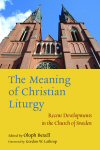
The Church of Sweden is the largest Lutheran church body in the world, with 6.5 million members that represent about 70% of the Swedish population. The Meaning of Christian Liturgy illuminates and explains the changes that have occurred in the liturgy of the Church of Sweden from 1980 to 2000. In the process, this volume asks a number of questions of immense importance not only within Sweden, but also for Christian churches in the English-speaking world, including:
- How does participation in a liturgy make clear what “church” is about?
- What does liturgical participation say about who or what God is and about the community’s encounter with God?
- How have churches lived with the changes and renewals introduced in the twentieth century?
- How does the church building shape worshipers’ ideas of God and of church?
Contributors
- Torbjörn Axner
- Oloph Bexell
- Sven-Erik Brodd, Gordon W. Lathrop
- Karin Oljelund
- Boel Hössjer Sundman
- Gunnar Weman
Oloph Bexell is professor of ecclesiology and ecclesial life and head of the department of church history at Uppsala University, Sweden.
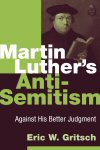
In this book Eric W. Gritsch, a Lutheran and a distinguished Luther scholar, faces the glaring ugliness of Martin Luther’s anti-Semitism head-on, describing Luther’s journey from initial attempts to proselytize Jews to an appallingly racist position, which he apparently held until his death.
Comprehensively laying out the textual evidence for Luther’s virulent anti-Semitism, Gritsch traces the development of Luther’s thinking in relation to his experiences, external influences, and theological convictions. Revealing greater impending danger with each step, Martin Luther’s Anti-Semitism marches steadily onward until the full extent of Luther’s racism becomes apparent. Gritsch’s unflinching analysis also describes the impact of Luther’s egregious words on subsequent generations and places Luther within Europe’s long history of anti-Semitism.
Throughout, however, Gritsch resists the temptation either to demonize or to exonerate Luther. Rather, readers will recognize Luther’s mistakes as links in a chain that pulled him further and further away from an attitude of respect for Jews as the biblical people of God. Gritsch depicts Luther as a famous example of the intensive struggle with the enduring question of Christian-Jewish relations. It is a great historical tragedy that Luther, of all people, fell victim to anti-Semitism—albeit against his better judgment.
Against his background of growing up in the Third Reich, his participation in interfaith dialogue over the years, and his more than half a century of studying Luther, Eric Gritsch, a widely respected church historian, provides readers with a broad survey of those who used or ignored the Reformer’s utterances on the Jews, and he critiques a large number of recent scholarly commentators on the subject, concluding that ‘Luther’s anti-Semitism is an integral part of his life and work . . . but his anti-Semitism is neither in harmony with the core of his theology nor with the stance of the Apostle Paul’ and is thus ‘against his better judgment.
—Robert Kolb, author, Martin Luther: Confessor of the Faith
Gritsch brings to this project a lifetime of Luther study, and it shows. This foundation grounds the whole work, from its thorough rehearsal of the relevant texts, to its judicious account of Luther’s impact, to its masterful use of the secondary literature, to its compelling conclusion. Highly recommended.
—Denis R. Janz, author, The Westminster Handbook to Martin Luther
Eric W. Gritsch (1931–2012) was professor emeritus of church history and former director of the Institute for Luther Studies, both at Lutheran Theological Seminary, Gettysburg, Pennsylvania. His many books include A History of Lutheranism, 2nd ed., Martin: God’s Court Jester, The Wit of Martin Luther, and Toxic Spirituality: Four Enduring Temptations of Christian Faith.
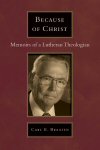
In this compelling memoir, Carl Braaten tells the story of his life as a theologian, from his early years as a missionary kid in Madagascar, to his years of study at the universities of Paris, Harvard, Heidelberg, and Oxford, to his decades of teaching. Throughout his narrative Braaten delves into the many theological movements, controversies, and personalities that have shaped his thinking and writing.
A well-written theological autobiography, Because of Christ is an intellectual travelogue par excellence, an informed chronicle of the chief theological conflicts of the twentieth century that have put the integrity of the gospel to the test.
Carl E. Braaten is professor emeritus of systematic theology at Lutheran School of Theology at Chicago and former executive director of the Center for Catholic and Evangelical Theology.
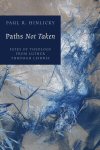
In this book, Paul Hinlicky suggests that—to the detriment of the church as a whole—Martin Luther’s legacy did not unfold as he himself would have hoped or expected. Paths Not Taken analyzes the unhappy fate of theology in the tradition of Luther through the pivotal early modern theological philosopher Gottfried Leibniz. Through this lens Hinlicky shows how the twofold intention of reforming the Church according to the gospel and providing a Christian philosophy of culture for a renewed Christendom diverged along the way.
In his conclusion Hinlicky considers three outstanding contemporary representatives of theology in Luther’s tradition—Pannenberg, Jungel, and Jenson—and settles on a path to be taken by Lutheran theology after Christendom and after modernity.
Hinlicky offers a powerful critique of major trends in modern theology, courageously addressing the questions most pertinent to theology’s dilemmas in modernity and exploring the history of how theology came to this pass. Paths Not Taken challenges theologians and philosophers of all persuasions to wrestle with the recovery of theology’s task and subject matter for today.
—Christine Helmer, professor of religion, Northwestern University
A compressed encyclopedic survey of philosophical and theological thought, this volume is truly groundbreaking in its development of philosophical themes. If there is any justice and sanity left on earth, this book will be required reading in theology and philosophy courses for a long time to come.
—Michael Shahan, book review editor, Journal of Lutheran Ethics
Paul R. Hinlicky is Tise Professor of Lutheran Studies at Roanoke College, Salem, Virginia.
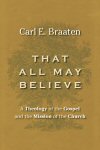
That All May Believe brings an evangelical catholic theological perspective to bear on controversial issues having to do with the truth of the gospel, the ecumenical quest for church unity, and the encounter of Christianity with other world religions. Here Carl Braaten argues and demonstrates that a theology may be evangelical without being Protestant, catholic without being Roman, and orthodox without being Eastern.
In sharp contrast to the older style of doing theology to bolster a particular denominational tradition or the newer style that revises the Christian faith to conform to modern culture, the ecumenical orthodoxy that emerges here does theology out of the common biblical and creedal mainstream of the Christian tradition. Braaten focuses on the core of Christianity—faith in Jesus Christ according to the Scriptures. He applies the criterion of Christ to many questions of Christian theology, pointing the way to a more complete and foundational theology for today.
A penetrating analysis of Western Christianity in crisis as well as an incisive and compelling guide for course correction. Written with clarity, insight, and conviction, That All May Believe is Braaten at his very best. A must-read for Christians in the northern hemisphere.
—Karl P. Donfried, Elizabeth A. Woodson 1922 Professor Emeritus of Religion, Smith College
Who else but Carl Braaten could show us an ecumenical vision of theology as evangelical but not simply Protestant, catholic but not just Roman, orthodox but not only Eastern? Here is a needed call to share our ecclesial gifts with mutual affirmation on classical convictions and mutual admonition regarding teachable differences. Yet all this is done with a well-known Braaten ‘edge’—indictment of conventional Christianity and a drifting academic theology. We are in the author’s debt for charting the right course toward visible unity and full communion for a church solid in its centralities and passionate about its mission.
—Gabriel Fackre, author, The Church
Employing his gift for incisive analysis of theological movements and trends according to the criterion of the saving gospel of Jesus Christ, Braaten affirms the catholic tradition with its canon of Scripture and historic dogmas as the indispensable bearer of the gospel. With evangelical passion for the missionary enterprise, he shows how the church must move toward ecumenical unity in order to bring the world to belief. He does not ignore the reality of the powers of evil that strive against the mission of the gospel. Nor does he shrink from saying that dialogue with the religions must not blunt the apostolic imperative to proclaim the gospel and bring converts into the community of faith in the crucified and risen Christ. This timely book, confessionally anchored and ecumenically hopeful, will engage theological readers from beginning to end.
—Frank C. Senn, Immanuel Lutheran Church, Evanston, IL
Carl E. Braaten is professor emeritus of systematic theology at Lutheran School of Theology at Chicago and former executive director of the Center for Catholic and Evangelical Theology.
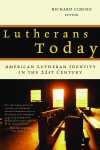
In the middle of the twentieth century, American Lutherans were newsworthy enough to find themselves on the cover of Time magazine. Their claim to fame? In an era when American churches were beginning to look and act alike, Lutherans’ strong confessional nature and stress on theology as well as their liturgy and ethnicity set them apart. They were “Protestants with a difference” at a time when differences were supposed to be dissolving in the American melting pot.
Subsequent years have posed serious questions to Lutheran identity, as disputes about the true nature of Lutheranism and the meaning of the Lutheran confessions, the structure of ministry, ecumenism, sexuality, and multiculturalism have all left their mark on Lutheran denominations. In Lutherans Today several historians, social scientists, journalists, and other leading experts map out the place of Lutheranism in the landscape of contemporary American Christianity and explore the directions in which it is heading in the new millennium.
Presenting new and original research, the book is divided into two sections. The first examines change and movements within American Lutheranism. Distinguished church historian Mark Noll here sets the scene by arguing that the predicament of American Lutheranism has always been the struggle to remain faithful to the enduring witness of the European Reformation while also accommodating itself to the democratic pluralism of the New World. Six other chapters discuss the Missouri Synod, the “Lutheran Left,” the Called to Common Mission agreement, the evangelical catholic movement within Lutheranism, the rise of megachurches, and Lutheran charismatics.
The second section considers trends and issues related to Lutheran identity, including politics and the pastorate, the impact of immigration and multiculturalism, the loss of Lutheran identity at Lutheran colleges and universities, and conflicting patterns of commitment among Lutheran youth.
As a whole, Lutherans Today will be valuable not only to all Lutherans but also to those interested in the development and current state of religious life in America.
Contributors
- Robert Benne
- Richard Cimino
- Maria Erling
- Mark Granquist
- Dan Hofrenning
- Robert Longman
- Steve Montreal
- Mark Noll
- Jim Petersen
- Eugene C. Roehlkepartain
- Alvin J. Schmidt
- Scott Thumma
- Mary Todd
- Jeff Walz
A valuable collection of essays. . . . A timely contribution to the contemporary discussion of what it means to be Lutheran in America today.
—Concordia Journal
This wide-ranging, provocative assessment of contemporary American Lutheranism draws on the expertise of its contributors to give a fair hearing to the conflicting movements competing for the soul of the church: liturgical renewal, confessionalism, political activism, evangelical pietism, even church-growth pragmatism. The distinguished church historian Mark Noll sets the scene for this conflict by arguing that the predicament of American Lutheranism has always been the struggle to remain faithful to the enduring witness of the European Reformation while also accommodating itself to the democratic pluralism of the New World.
—Walter Sundberg, professor of church history, Luther Seminary
Richard Cimino is editor and publisher of Religion Watch, a newsletter monitoring trends in contemporary religion. He is also the author of Trusting the Spirit: Renewal and Reform in American Religion, Shopping for Faith: American Religion in the New Millennium (with Don Lattin), and Against the Stream: The Adoption of Traditional Christian Faiths by Young Adults.
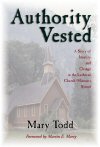
Like other major Protestant denominations in the United States, the 2.6-million-member Lutheran Church-Missouri Synod (LCMS), founded in 1847, has struggled with issues of relevance and identity in society at large. In this book, Mary Todd chronicles the history of this struggle for identity in the LCMS, critically examining the central—often contentious—issue of authority in relation to Scripture, ministry, and the role of women in the church. In recounting the history of the denomination, Todd uses the ministry of women as a case study to show how the LCMS has continually redefined its concept of authority in order to maintain its own historic identity. Based on oral histories and solid archival research, Authority Vested not only explores the internal life of a significant denomination but also offers critical insights for other churches seeking to maintain their distinct Christian characteristics in religiously pluralistic America.
One does not have to be a Missouri Synod Lutheran, a Lutheran at all, a Christian or a religious person at all, to become engaged by these pages. They deal with basic human themes. . . . I think most will be impressed by [Mary Todd’s] fair-mindedness, her calm tone of voice, her patient story-telling, and her invitation to readers to find more angles than before on the sex-and-authority combination that will mark both resistant and bold church bodies and individuals alike.
—Martin E. Marty, Fairfax M. Cone Distinguished Service Professor Emeritus of the History of Modern Christianity, University of Chicago Divinity School, (from the foreword)
Well worth reading by anyone interested in churches caught between tradition and modernity.
—Calvin Theological Journal
This is not a dry history. The descriptions of specific people, places and occasions reveal the dramatic tensions and energies shaping modern American Lutheranism.
—The Lutheran
An intelligent analysis of the problem of authority—pastoral, theological, scriptural and gender—in a sect preoccupied with authority . . . Mary Todd, a lifelong member of the Lutheran Church-Missouri Synod, has written a dispassionate and useful account.
—Journal of Ecclesiastical History
A well-written and well-documented case study of authoritarianism in a church body by a gifted historian.
—Christian Century
Mary Todd is associate professor of history and director of the honors program at Concordia University in River Forest, Illinois.
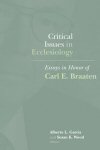
This volume compiles essays that engage important issues faced by the Christian church in witness and ministry.
Renowned for his unique slant on ecclesial affiliation—by his own confession “evangelical without being Protestant, catholic without being Roman, and orthodox without being Eastern”—Lutheran theologian Carl E. Braaten has long been a respected voice in ecclesiological discourse. In Critical Issues in Ecclesiology the voices of 11 authors from a variety of church traditions come together to honor Braaten in a volume that seeks the renewal of the church, the clarifying of its catholic evangelical witness to the apostolic faith, and the restoration of its “passion for mission” within the Great Tradition.
Alberto L. García is professor of theology at Concordia University Wisconsin, where he directs the lay ministry program. Among his books are The Theology of the Cross for the Twentieth Century and Cristología: Cristo Jesús Centro y Praxis del Pueblo de Dios.
Susan K. Wood is professor and chair of the department of theology at Marquette University. Her books include The Ecumenical Implications of the Doctrine of Baptism and Ordering the Baptismal Priesthood: Theologies of Lay and Ordained Ministry.
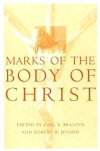
Martin Luther once listed seven “marks” of the church-those defining ecclesial features that show where the true church is to be found. This insightful volume brings together essays by 10 leading Catholic, Episcopal, Lutheran, Methodist, and Orthodox theologians, each analyzing one of the seven traditional marks of the church and discussing how it is found, or not found, in today’s churches.
Writing about each “mark” of the church are these scholars: Gerhard O. Forde and Richard Lischer on proclamation; Susan K. Wood and John H. Erickson on baptism; K. Paul Wesche and Richard A. Norris Jr. on the Eucharist; David S. Yeago on the office of the Keys; Carl E. Braaten on ordination; Robert W. Jenson on catechesis; and William J. Abraham on discipleship.
This is a delightful romp through Luther’s seven marks of the church. . . . Is it possible that the North American evangelical world will start taking its ecclesiology seriously again? This book is a hopeful sign.
—Calvin Theological Journal
Insofar as the authors offer not only descriptive, but critical, insight on proclamation, baptism, Eucharist, the office of the Keys, ordination, catechesis, and discipleship, they invite wide ecumenical discussion on the state of the Christian church today.
—Religious Studies Review
Carl E. Braaten is professor emeritus of systematic theology at Lutheran School of Theology at Chicago and former executive director of the Center for Catholic and Evangelical Theology.
Robert W. Jenson is codirector of the Institute for Theological Inquiry and was cofounder and longtime associate director of the Center for Catholic and Evangelical Theology.
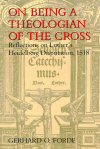
While there is increasing interest in the “theology of the cross,” few people have specific knowledge of what makes it different from other kinds of theology. Gerhard O. Forde here provides an introduction to this theological perspective through an analysis of Luther’s Heidelberg Disputation of 1518, the classic text of the theology of the cross.
The book first clarifies the difference between a theology of glory and a theology of the cross and explains how each perspective shapes the very nature of being a theologian. The main body of the book provides commentary on the Heidelberg Disputation—the only complete analysis of this document currently available. Underlying Forde’s exposition is the contention that one ought not speak of the theology of the cross as merely another item among a host of theological options; instead, one must pursue what it means to be a theologian of the cross and to look at all things through suffering and the cross.
Among contemporary English language writers, few have communicated the central insights of the young Luther’s theology with greater ease and clarity than Luther Seminary’s Gerhard Forde . . . Forde brings his intimate familiarity with the young Martin Luther to bear not on the question of the theology of the cross per se, but on the problem of being, as he puts it, a theologian of the cross . . . Forde skillfully unfolds the compact and sometimes hyperbolic language of Luther’s theses with an expert’s surefooted sense for the terrain. The style throughout is clear and accessible, a fact which makes the book both a logical choice for seminary students and an edifying read for the pastor or educated lay person . . . Forde’s compact and accessible contribution is a welcome addition to the fold.
—Journal of the Evangelical Theological Society
Forde does not just write about a theology of the cross; he demonstrates what a theologian of the cross is through his very way of writing. It is a small book and easy to read, and yet it is a great and weighty tome. It is also a most demanding or even scandalous book. Indeed, Forde does answer the question: what is the theology of the cross?
—Lutheran Quarterly
Vintage Forde—a straight out, ‘tell it the way it is’ presentation of sin and grace, life and faith, Christ and salvation . . . Here is a book worth working through and thinking through for any theologian. It would be particularly helpful as a small group study for ‘theologians.’
—Word & World
Gerhard Forde’s book on the theological portion of the Heidelberg theses may help to correct the neglect of them in the church. It deals directly with the theses, seriatim, in a way that no other book of which I know does . . . The 30 pages of preface and introductory matters are themselves worth the cost of the book.
—Trinity Seminary Review
Gerhard O. Forde (1927–2005) was professor emeritus of systematic theology at Luther Seminary, St. Paul, Minnesota.
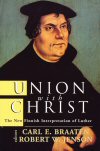
This important book introduces the English-speaking world to the new Finnish interpretation of the theology of Martin Luther, initiated by the writings of Tuomo Mannermaa of Helsinki University.
At the heart of the Finnish breakthrough in Luther research lies the theme of salvation. Luther found his answer to the mystery of salvation in the justifying work of Christ received through faith alone. But Protestant theology has never enjoyed a consensus on how to interpret the Reformation doctrine of justification by faith. In opposition to the traditional forensic understanding of justification, Mannermaa argues that for Luther, “Christ is really present in faith itself.” Mannermaa’s interpretation of Luther’s view of justification is thus more ontological and mystical than ethical and juridical. As such, his work challenges a century of scholarly opinion concerning a foundational doctrine of Protestant theology.
The editors are to be congratulated for offering for the first time in English a handy synopsis of current Finnish scholarship on Luther by its leading proponents, whose theories have attracted considerable attention in recent times.
—Theology Today
This book is valuable for the introduction of English-speaking Lutherans to the world of Finnish Luther interpretation . . . The reflective pastor will be able to recognize new angles for preaching and teaching that run counter to traditional conceptions. The Finns deserve praise for their efforts to provide a new entry point into the magnificent corpus of Luther’s work.
—Word & World
Even in a time when there is so much turmoil in the ecumenical movement, conflicts within the WCC and NCC, protests from member churches, particularly criticism from the Orthodox churches and strong appeals for quitting ecumenical participation by the Orthodox, it is heartening to be able to point out something genuinely good, true and beautiful, stemming from encounters among divided Christians. This excellent volume of essays by the recent or ‘new’ Finnish Lutheran scholars is just such a find.
—St. Vladimir’s Theological Quarterly
Carl E. Braaten is professor emeritus of systematic theology at Lutheran School of Theology at Chicago and former executive director of the Center for Catholic and Evangelical Theology.
Robert W. Jenson is codirector of the Institute for Theological Inquiry and was cofounder and longtime associate director of the Center for Catholic and Evangelical Theology.
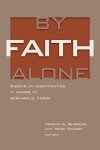
The Lutheran confessions call the doctrine of justification by faith alone the “chief article” of the Christian faith. Clarifying and defending this article of faith have been the major concern of Lutheran theologians since the sixteenth century. It is not surprising, then, that one of today’s most prominent Lutheran thinkers, Gerhard O. Forde, has chosen to devote most of his career to probing the depths and developing the implications of the doctrine of justification. And as this volume aptly indicates, Forde’s teaching and publications, his public lectures and sermons, and his influence on ecumenical scholarship and debate constitute one of the most important contributions to a theological understanding of justification in the second half of the twentieth century.
By Faith Alone celebrates Professor Forde’s distinguished career, but it also goes well beyond by offering a sustained and serious engagement with his theological motif. Written by 20 theologians from seven countries and several different Christian communions, the book provides a full-orbed, cutting-edge discussion of the doctrine of justification from a wide range of perspectives. The first set of essays explores the theological foundations of the doctrine of justification. The next set examines some key moments in the doctrine’s historical development as well as its ecumenical trajectory. The last set of essays asks how the doctrine of justification applies to church life today, including such ecclesiastical concerns as preaching and pastoral care.
A rich collection of lively and profound thinking, By Faith Alone is an ideal resource for teachers, preachers, church leaders, and all those pursuing a deeper understanding of Christian belief.
Contributors
- C. FitzSimons Allison
- Oswald Bayer
- Robert Bertram
- Joseph A. Burgess
- Avery Cardinal Dulles, S.J.
- Reginald H. Fuller
- Leif Grane
- Roy A. Harrisville
- Scott Hendrix
- Robert Kolb
- Marc Kolden
- George Lindbeck
- Inge Lønning
- James Arne Nestingen
- John H. Rodgers Jr.
- Klaus Schwarzwäller
- Jane E. Strohl
- George H. Tavard
- Timothy J. Wengert
- Vítor Westhelle
Gerhard Forde surely belongs in the top rank of North American historical and systematic theologians of the late twentieth century. He ably represented a major wing of his communion by advocating a ‘radical Lutheranism’ that often involved controversial implications for his church’s polity, ethics, and ecumenics. By Faith Alone pays tribute to Forde’s long and fruitful teaching ministry through a collection of thematically interrelated essays by outstanding theologians, including such eminent non-Lutherans as C. FitzSimons Allison, Avery Dulles, Reginald Fuller, John H. Rodgers Jr., and George Tavard. The multifaceted research presented here rotates around the doctrine of justification by faith alone and is undertaken in appreciative dialogue with Forde’s own impressive scholarship on death-and-life justification, including its basis, background, and current applications. In short, here is a personalized review of cutting-edge ecumenical developments in current doctrine, as viewed through the prism of a highly respected participant.
—William H. Lazareth, professor of theology, Princeton Theological Seminary
This Festschrift, including articles by contemporary ecumenical and theological giants, refreshingly does not idealize but critically engages Gerhard Forde’s work. In dialogue with Forde, the essayists deal passionately and sometimes contentiously with confessional, ecumenical, and pastoral issues that currently confront the church. The confessional diversity and stellar ability of the authors testify to the tenacity and life of Forde’s thought. The essays are worthy of Forde’s conviction that theology is for proclamation. These essays show that Forde’s theology bears ecumenical rapprochement by enduring disagreements, engages the mind for the service of the church, and seeks to hear and share God’s faithfulness.
—Mark C. Mattes, associate professor of religion and philosophy, Grand View College
This volume honors the significant contribution of Gerhard O. Forde to the unmistakable proclamation and sound doctrine of justification by faith alone.
—Gerhard Sauter, professor of systematic and ecumenical theology, University of Bonn, Germany
Marc Kolden is professor of systematic theology at Luther Seminary, St. Paul, Minnesota.
Joseph A. Burgess is a Lutheran pastor and theologian. He is the former executive director of the Division of Theological Studies of the Lutheran Council in the US.
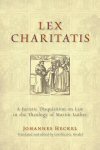
This substantial work by one of Europe’s most respected twentieth-century legal minds unpacks Luther’s doctrine of law, showing how it derived from his central theological concern, justification by faith.
When Johannes Heckel’s Lex Charitatis appeared more than half a century ago, it brought new clarity to the much-disputed issue of Luther’s understanding of the law and of God’s governance of his created order. The Wittenberg reformer’s use of the language of ‘two kingdoms’ and ‘two governances’ is still fiercely debated; having Heckel’s work in English will assist scholars and students alike in putting Luther’s insights to use in the context of twenty-first-century problems.
—Robert Kolb, professor emeritus of Systematic Theology, Concordia Seminary
This translation of Lex Charitatis makes available to the English-speaking world an essential study of Luther’s doctrine of law. The German editions of the book had a major impact on Luther scholarship, and Gottfried Krodel’s translation will greatly expand the reach and influence of this great work.
—Jay Conison, dean, Charlotte School of Law
This classic title by Johannes Heckel has long been an effective bridge-builder among German Lutheran theologians, jurists, and historians. Drawing on an impressive command of the original sources, Heckel shows how Martin Luther transformed our understanding of Gospel and Law, faith and works, church and state. Luther moved from the early iconoclast who scorned the jurists and burned the canon laws to a mature reformer who reformed the law and built an impressive political theology. Gottfried Krodel has captured the full power and prescience of this masterwork of Lutheran scholarship.
—John Witte Jr., Robitscher Professor of Law, Emory University
Johannes Heckel (1889–1963) was professor of public law at the University of Munich, Germany.
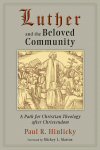
Is Christian belief tenable today? Is it possible to be a creedal Christian? With the help of Martin Luther, Paul Hinlicky here explores classical Christian beliefs regarding the person and work of Christ and human nature and destiny. He also counters contemporary objections to creedal faith, from the so-called “new perspective on Paul” to Pope Benedict’s rejection of the Augsburg Confession to the continuing challenge of Marx.
Luther and the Beloved Community does not present Luther’s medieval thought as a possibility for today, but does make him available for the future as a teacher of the faith and a help for tackling contemporary questions of Christian belief. According to Hinlicky, Luther is misused and misunderstood by those of his own tradition and needs to be understood not as “hero of the faith” but rather as the proponent of a beloved community that does not yet fully exist. In performing this makeover, Hinlicky reveals genuine new insights concealed within Luther’s rhetoric.
Paul Hinlicky has produced another important volume interconnecting the reconsideration of the heritage of Luther and the needs of contemporary theology. Whether or not one agrees with all of Hinlicky’s proposals (and this book contains many), his ideas are consistently rewarding and thought-provoking. He does not repeat received wisdom but explores paths at once traditional and new. Anyone who cares about the future of the legacy of the Reformation should attend to what Hinlicky is saying.
—Michael Root, ordinary professor of systematic theology, Catholic University of America
Admitting in good postmodern fashion that he is enlisting ‘my Luther’ to construct an argument in ‘critical dogmatics,’ Hinlicky lays out a new agenda for our use of recent Luther research . . . Hinlicky’s incisive argument and interpretation of how Luther’s thought functions as a whole to address specific issues on the table in social and ecumenical arenas will command attention and provoke discussion, furthering both Luther studies and a twenty-first-century critical dogmatics.
—Robert Kolb, professor emeritus of Systematic Theology, Concordia Seminary
Paul R. Hinlicky is Tise Professor of Lutheran Studies at Roanoke College, Salem, Virginia.
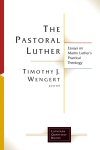
This text explores a long-neglected aspect of Martin Luther—his life and ministry as a pastor.
Sixteen church historians here examine Martin Luther in an uncommon way—not as Reformer or theologian but as pastor. Luther’s work as parish pastor commanded much of his time and energy in Wittenberg.
After first introducing the pastoral Luther, including his theology of the cross, these chapters discuss Luther’s preaching and use of language (including humor), investigate his teaching ministry in depth, especially in light of the catechism, and explore his views on such things as the role of women, the Virgin Mary, and music. The book finally probes Luther’s sentiments on monasticism and secular authority.
Contributors
- Charles P. Arand
- James M. Estes
- Eric W. Gritsch
- Robert Kolb
- Beth Kreitzer
- Robin A. Leaver
- Mickey L. Mattox
- Ronald Rittgers
- Robert Rosin, Reinhard Schwarz
- Jane E. Strohl
- Christoph Weimer
- Dorothea Wendebourg
- Timothy J. Wengert
- Vftor Westhelle
- H.S. Wilson
A rich and reliable collection of essays that portray a less familiar but vital dimension of Luther’s work.
—Scott H. Hendrix, James Hastings Nichols Professor of Reformation History and Doctrine, Princeton Theological Seminary
The Reformation had its origin in a crisis of pastoral care, and Luther’s reforming work would leave no aspect of ministerial practice, church life, catechesis, or piety untouched. In rich and informative essays drawn from the work of an international array of recognized Luther scholars, the Reformer’s evangelical views on preaching and Christian education, sacramental practice and consolation in the face of suffering, art, and piety are presented in light of challenges faced by twenty-first-century pastors. The Pastoral Luther will be an indispensable tool not only for Reformation scholars but also for pastoral theologians who seek to understand and anchor contemporary practices in the ancient yet ever lively confession of God’s grace articulated by the Wittenberg pastor. Luther’s pastoral theology has been a neglected theme; this volume happily fills the void with first-rate scholarship that will serve both academy and church.
—John T. Pless, assistant professor of pastoral ministry and missions, Concordia Theological Seminary
Timothy J. Wengert is Ministerium of Pennsylvania Professor of Church History at the Lutheran Theological Seminary in Philadelphia. He is also coeditor of the 2000 English edition of The Book of Concord.
This title is included in the following collections
You can save when you purchase this product as part of a collection.
Logos 7 Lutheran Diamond Legac...
$2,999.99$2,999.99Bible Reference Bundle 2.0
$4,512.95$3,599.99Logos 7 Lutheran Portfolio Leg...
$4,749.99$4,749.99Logos 8 Collector's Edition Le...
$11,399.99$11,399.99
- $21,749.99
- $24,999.99